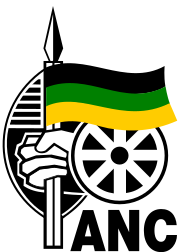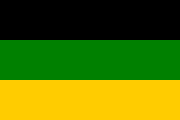
Back African National Congress Afrikaans المؤتمر الوطني الإفريقي Arabic المؤتمر الوطنى الافريقى ARZ Congresu Nacional Africanu AST Afrika Milli Konqresi Azerbaijani Афрыканскі нацыянальны кангрэс Byelorussian Африкански национален конгрес Bulgarian আফ্রিকান ন্যাশনাল কংগ্রেস Bengali/Bangla African National Congress Breton Congrés Nacional Africà Catalan
The African National Congress (ANC) is a political party in South Africa. It originated as a liberation movement known for its opposition to apartheid and has governed the country since 1994, when the first post-apartheid election resulted in Nelson Mandela being elected as President of South Africa. Cyril Ramaphosa, the incumbent national President, has served as President of the ANC since 18 December 2017.[8]
Founded on 8 January 1912 in Bloemfontein as the South African Native National Congress, the organisation was formed to advocate for the rights of black South Africans. When the National Party government came to power in 1948, the ANC's central purpose became to oppose the new government's policy of institutionalised apartheid. To this end, its methods and means of organisation shifted; its adoption of the techniques of mass politics, and the swelling of its membership, culminated in the Defiance Campaign of civil disobedience in 1952–53. The ANC was banned by the South African government between April 1960 – shortly after the Sharpeville massacre – and February 1990. During this period, despite periodic attempts to revive its domestic political underground, the ANC was forced into exile by increasing state repression, which saw many of its leaders imprisoned on Robben Island. Headquartered in Lusaka, Zambia, the exiled ANC dedicated much of its attention to a campaign of sabotage and guerrilla warfare against the apartheid state, carried out under its military wing, uMkhonto we Sizwe, which was founded in 1961 in partnership with the South African Communist Party (SACP). The ANC was condemned as a terrorist organisation by the governments of South Africa, the United States, and the United Kingdom. However, it positioned itself as a key player in the negotiations to end apartheid, which began in earnest after the ban was repealed in 1990.
In the post-apartheid era, the ANC continues to identify itself foremost as a liberation movement, although it is also a registered political party. Partly due to its Tripartite Alliance with the South African Communist Party (SACP) and the Congress of South African Trade Unions, it has retained a comfortable electoral majority at the national level and in most provinces, and has provided each of South Africa's five presidents since 1994. South Africa is considered a dominant-party state. However, the ANC's electoral majority has declined consistently since 2004, and in the most recent elections – the 2021 local elections – its share of the national vote dropped below 50% for the first time ever.[9] Over the last decade, the party has been embroiled in a number of controversies, particularly relating to widespread allegations of political corruption among its members.
- ^ Harper, Paddy (18 December 2022). "Existential crisis-ANC membership drops by more than one third in five years". Mail and Guardian. Retrieved 18 December 2022.
- ^ "South Africa • Africa Elects".
- ^ "How Democratic is the African National Congress? | Request PDF". Retrieved 16 February 2024.
- ^ Lissoni, Arianna; Soske, JON; Erlank, Natasha; Nieftagodien, Noor; Badsha, Omar, eds. (2012). One Hundred Years of the ANC. doi:10.18772/22012115737. ISBN 978-1-77614-287-3. JSTOR 10.18772/22012115737.
- ^ Fatton, Robert (2 February 1984). "The African National Congress of South Africa: The Limitations of a Revolutionary Strategy". Canadian Journal of African Studies / Revue Canadienne des Études Africaines. 18 (3): 593–608. doi:10.1080/00083968.1984.10804082. JSTOR 484771.
- ^ "South Africa" (PDF). European Social Survey. Archived (PDF) from the original on 9 October 2022. Retrieved 12 March 2019.
- ^ Burke, Jason (18 December 2017). "Cyril Ramaphosa chosen to lead South Africa's ruling ANC party". The Guardian. ISSN 0261-3077. Retrieved 19 December 2017.
- ^ Cele, S'thembile (4 November 2021). "ANC Support Falls Below 50% for First Time in South African Vote". Bloomberg. Retrieved 25 July 2022.
© MMXXIII Rich X Search. We shall prevail. All rights reserved. Rich X Search

